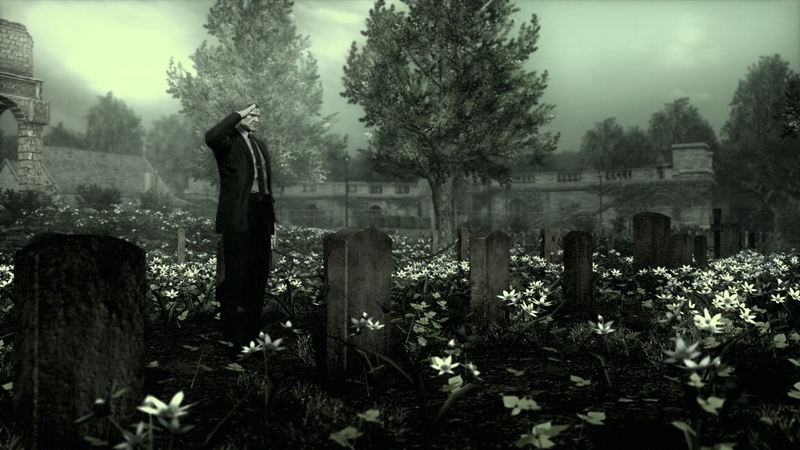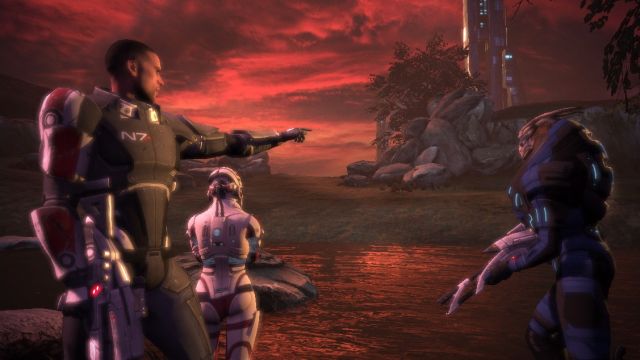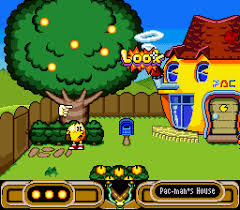Editor's note: Jon contends that a game's story ultimately doesn't matter. I tend to disagree, but that comes from a guy who has rated over 2,000 movies on Netflix and has a bookshelf stuffed to capacity. Maybe he's right: Games don't need stories to do what they do best. -James
Games are moving toward a richer narrative experience with every passing generation. Metal Gear Solid's story was detailed and complex, and the story of Snake's recent outing on the PlayStation 3 has grown like a metastasizing cancer cell. As with melanoma, this isn't a good thing, and yet fans of Guns of the Patriots praise the game in spite of its labyrinthine plot.

Goodbye, intelligible plot.
Because of modern consoles' added horsepower, games can choose to emulate film to an extent never before possible. Emotional resonance is becoming a primary focus of video games instead the old standbys: running, jumping, shooting, solving. In Quantic Dream's Heavy Rain, the core mechanics amount to choosing characters' decisions and watching the consequences unfold.
Many herald it as the coming of a new way to play — finally an "adult" experience alongside so many immature, fantasy-riddled fragfests. Those who dismiss it do so on the basis of its conceit as an interactive story. For those players, the story doesn't work, or it upsets them with its improbability. When a game is largely a narrative, its success hinges on its believability.
A game without story only needs to be a good game. Both are difficult to create for vastly different reasons. In my opinion, to play a game is not to experience the swooping thrills of an unpredictable storyline. For this we have novels, films, and our own convoluted lives. When a game captures me it does so through some ephemeral magic and a formula comprised of challenge, gameplay, surprise — namely, fun. Story only serves to limit a creator's imagination. It hems in what should be infinite: the boundaries of the game's imaginary world.
This lack of limitation is why the Super Mario Bros. series has continued to succeed for over 25 years. Some see Mario as a relic of the past, an infantile hanger-on unhip to today's standards of bulging, bloom-lit musculature. But those who play the games understand why they consistentally succeed — both critically and at retail — in spite of a story boiled down beyond picture-book basics: They are inventive, whimsical forays into the impossible. And they are fun to play.

He looked across the rocky plain, saw what stood before him, and realized he'd left the stove on.
Story is incidental at best; it's caustic and distracting at worst. Games don't need more or better stories. They merely need to make us play them in new and satisfying ways. The novel is there, unchanging, whether we read it or not. So is the film. So are most game storylines. But games shouldn't be inert. We, the player, should be able to dynamically change and mold the story through decisions acted upon. I feel that stories are unnecessary and obfuscate a game's true purpose: to be played. Mass Effect perhaps gets closest to a player-driven storyline, but no matter how many NPCs you talk to, Bioware has predetermined any and every forked path. In the end, it's merely the prettiest Choose Your Own Adventure game ever.

The nearest gas station? Sure, take a right at the giant stone plinth. Can't miss it.
I realize many will object — and rightfully so. Many games thrill players with absorbing tales. A Final Fantasy character dies, and a million fans weep over their DualShocks. Heavy Rain — and to some extent BioShock — shows us the stirring consequence to an accumulation of mundane choices, and gamers feel something they rarely feel while staring into a screen: responsibility.
These are not small rewards; these are true emotional responses, and we should applaud the ability of games to elicit them. But I maintain this shouldn't be the end goal. I worry that too much of what makes games unique from literature or cinema — relatively static mediums — will be lost if all games going forward strive to repeat a theatrical or literary experience. A book would never try and duplicate the sensation of playing Pac-Man. Why do games set out to mimic other forms when their own structure is enough?

Pac-Man 2: The New Adventures: Anna Karenina, it is not.
Yes, a well-integrated story can lift a mere exercise in puzzle-solving into a higher realm. I'm thinking of Portal's GLaDOS and her "motivational" dialogue. I'm thinking of Zelda's many legends that begin anew with each generation and, together, unfold into a mythology akin to that of ancient oral tradition. The stories change and grow richer with each new audience. But if I had to choose, I'd plunk down in front of a well-made game that I actually played, instead of a beautifully-told story I mostly watched. Lucky for us, we don't have to choose. Both kinds are available — and evolving every day. As long as that's the case, I'm a happy gamer.

